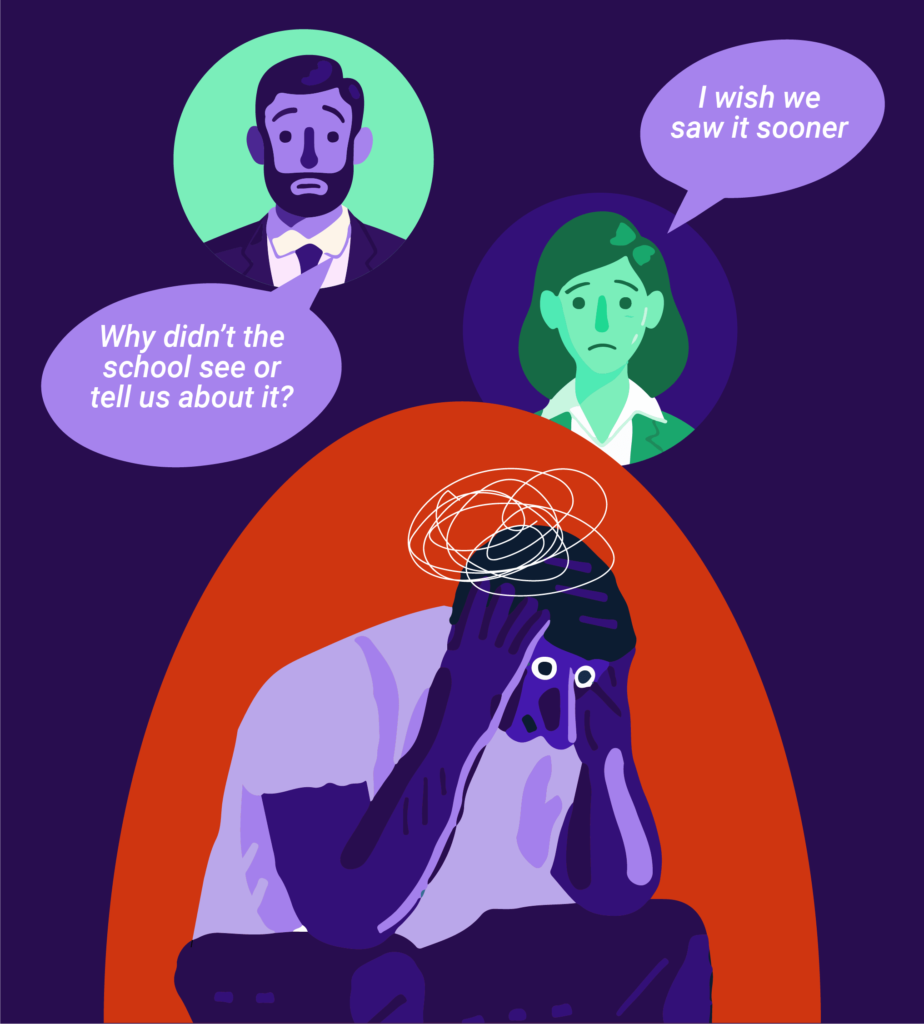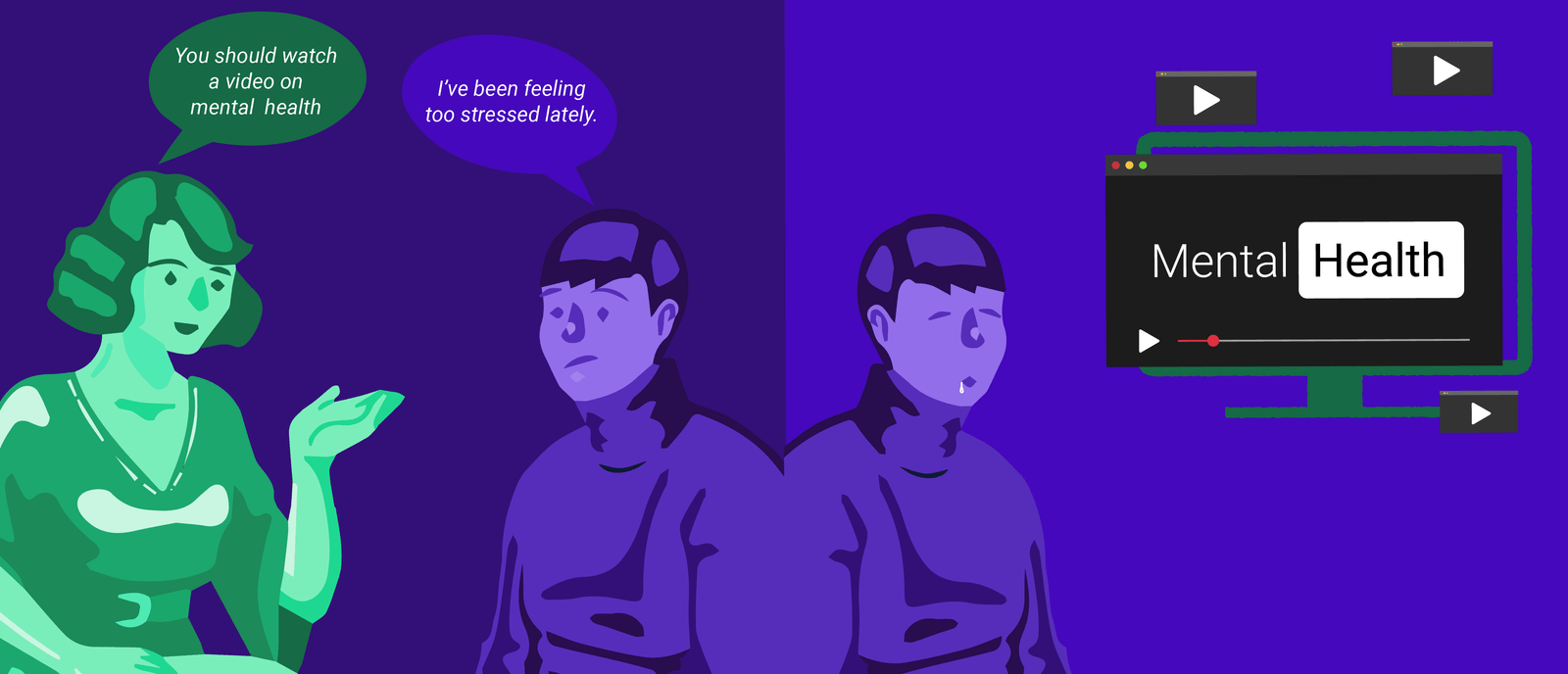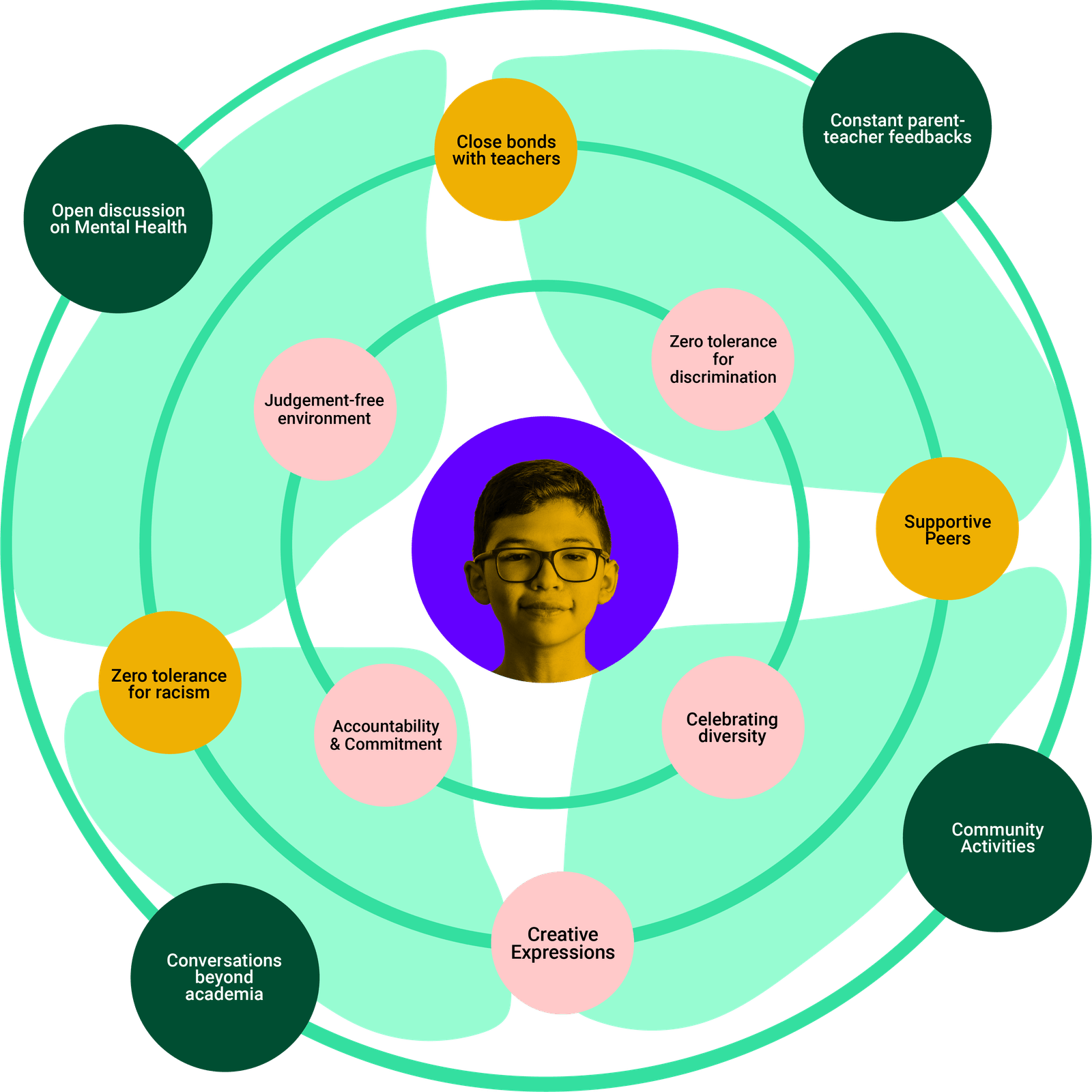

We all know someone or have at least heard stories of a child struggling with mental health issues – addiction, depression, attempted suicide, eating disorder, crippling anxiety and many others.

Sadly, lots of these stories often end up with the same narrative – “I wish we saw it sooner”, or “why didn’t the school see or tell us about it?”
Some stories are luckier than others – parents, teachers or friends saw something was amiss, and reached out before it spiralled to a regrettable ending.
The unlucky stories, however, are filled with sorrows and regrets. In the end, families are left to wonder what went wrong or who’s to be blamed? But it would have been too late.
We all know someone or have at least heard stories of a child struggling with mental health issues –

Sadly, lots of these stories often end up with the same narrative – “I wish we saw it sooner”, or “why didn’t the school see or tell us about it?”
Some stories are luckier than others – parents, teachers or friends saw something was amiss, and reached out before it spiralled to a regrettable ending.
The unlucky stories, however, are filled with sorrows and regrets. In the end, families are left to wonder what went wrong or who’s to be blamed? But it would have been too late.

With how vastly exposed our children are, an effective pastoral care needs to exist EVERYWHERE for the child. We cannot let loose by simply telling them to watch some videos about mental health, expecting it would solve or prevent them from falling prey – this is denial, not an “optimistic goal”.

With how vastly exposed our children are, an effective pastoral care needs to exist EVERYWHERE for the child.

We cannot let loose by simply telling them to watch some videos about mental health, expecting it would solve or prevent them from falling prey – this is denial, not an “optimistic goal”.

A model to build versatile individuals.


A model to build versatile individuals.








Every interaction, activity or experience create strong impressions on our children.
Parents that curse, tend to raise kids that curse; mingling with kids that bully, may influence our kids to bully; teachers that don’t love learning themselves, don’t suddenly produce students who love learning.
Both people and environment are pivotal in our children’s development.
Both people and environment are pivotal in our children’s development.
It would be impossible to keep our children from seeing or experiencing anything bad entirely – we might as well lock them up in a cellar and not experience anything at all. We need to teach them how to react to situations and how to clearly distinguish between right and wrong.

What we need to focus on, is to create more positive experiences than the negative ones. Our kids need to see and do more good things than they do bad. Because then, these “good things” become the norm for them. These experiences are what they will draw upon every time they have to react to conflict.
Only then it would not matter who they come in contact with – they will always know where true north is. If their norm is good, then good is what they draw upon and vice versa.

Community in its essence, is at the very heart of our OMNICARE model. Raising children, the ones who will one day be leading our world to either doom or dream, is both crucial and difficult. Hence, teachers alone cannot work in silo as saviour and superhero.
An effective pastoral care requires support and attention from every member of the Pasxcel community – Teachers, Students, Parents and School Management all play vital roles in students’ development and wellbeing. EVERYONE has to commit and work together.
This model ensures that our pastoral care is omnipresent. It exists in every touch point of their education – curriculum, activities, feedback, assignments, lessons etc. To understand further, continue below to see the initiatives our community is actively taking at Pasxcel.
Every interaction, activity or experience create strong impressions on our children.
Parents that curse, tend to raise kids that curse; mingling with kids that bully, may influence our kids to bully; teachers that don’t love learning themselves, don’t suddenly produce students who love learning.

Both people and environment are pivotal in our children’s development.
It would be impossible to keep our children from seeing or experiencing anything bad entirely – we might as well lock them up in a cellar and not experience anything at all. We need to teach them how to react to situations and how to clearly distinguish between right and wrong.

What we need to focus on, is to create more positive experiences than the negative ones. Our kids need to see and do more good things than they do bad. Because then, these “good things” become the norm for them. These experiences are what they will draw upon every time they have to react to conflict.
Only then it would not matter who they come in contact with – they will always know where true north is. If their norm is good, then good is what they draw upon and vice versa.

Community in its essence, is at the very heart of our OMNICARE model. Raising children, the ones who will one day be leading our world to either doom or dream, is both crucial and difficult. Hence, teachers alone cannot work in silo as saviour and superhero.
An effective pastoral care requires support and attention from every member of the Pasxcel community – Teachers, Students, Parents and School Management all play vital roles in students’ development and wellbeing. EVERYONE has to commit and work together.
This model ensures that our pastoral care is omnipresent. It exists in every touch point of their education – curriculum, activities, feedback, assignments, lessons etc. To understand further, continue below to see the initiatives our community is actively taking at Pasxcel.

With social media being an integral part of our lives, our children are more susceptible to anxiety, identity crises, cyber-bullying and many others as a result of interacting with or comparing themselves to others with ‘picture-perfect’ lives on Instagram and TikTok.
These sessions highlight the importance of mental wellness and how to develop emotional intelligence. We constantly stay updated to developing trends in culture to ensure topics discussed are relevant to modern- day teenagers. Emerging issues such as cyber-bullying, body image, relationships, and social media are covered and discussed with students.

Creative assignments such as poem-writing, drawing and music-writing are conducted to boost confidence, while teaching them self-expression through various methods. Through their opinions on these topics, along with their works of expressions, we are also able to gauge and monitor their inner thoughts and current mental states.

With social media being an integral part of our lives, our children are more susceptible to anxiety, identity crises, cyber-bullying and many others as a result of interacting with or comparing themselves to others with ‘picture-perfect’ lives on Instagram and TikTok.
These sessions highlight the importance of mental wellness and how to develop emotional intelligence. We constantly stay updated to developing trends in culture to ensure topics discussed are relevant to modern- day teenagers. Emerging issues such as cyber-bullying, body image, relationships, and social media are covered and discussed with students.
Creative assignments such as poem-writing, drawing and music-writing are conducted to boost confidence, while teaching them self-expression through various methods. Through their opinions on these topics, along with their works of expressions, we are also able to gauge and monitor their inner thoughts and current mental states.

“One for all and all for one” – this is one of our daily mantras at Pasxcel.
Being in a highly community-centric school has developed our students to become empathetic and compassionate not only for themselves but also for their peers.
Peer tutoring at Pasxcel has been beneficial for both student tutor and tutee. It builds accountability and teamwork among students as they learn to help one another to ensure the entire class/team moves forward together.
The direct interaction among students promotes active learning as student tutors are able to reinforce their learning by teaching, and tutees are able to grasp concepts from the point of view of a relatable peer.

“One for all and all for one” – this is one of our daily mantras at Pasxcel.
Being in a highly community-centric school has developed our students to become empathetic and compassionate not only for themselves but also for their peers.
Peer tutoring at Pasxcel has been beneficial for both student tutor and tutee. It builds accountability and teamwork among students as they learn to help one another to ensure the entire class/team moves forward together.
The direct interaction among students promotes active learning as student tutors are able to reinforce their learning by teaching, and tutees are able to grasp concepts from the point of view of a relatable peer.

At Pasxcel Academy, help is always accessible and never short for those in need.
Our teachers will provide one-to-one tutoring sessions for students needing extra care and attention in any area of their curriculum. All these are included as part of students’ education. Everyone should be ahead, and no one gets left behind. Tuition centres should be a thing of history.


At Pasxcel, help is always accessible and never short for those in need.
Teachers will provide one-to-one tutoring sessions for students needing extra care and attention in any area of their curriculum. All these are included as part of students’ education. Everyone should be ahead, and no one gets left behind. Tuition centres should be a thing of history.

People from all walks of lives are invited to share their expertise or experiences when it comes to mental health.
Apart from experts and professionals, such as counsellors and psychologists, we also invite parents, Pasxcel alumnus, students and teachers to discuss their views and experiences.
We aim to normalise all talks about mental health and emotional wellbeing. Allowing students to be in proximity of prominent figures and seeing first-hand how even the great ones have troubles, teaches them that what matters most is not the troubles that come, but in how we handle it.
We believe that leaving the table open for discussion to everyone regardless of background, age or experience, will destigmatise the topic. Not only would it create a positive environment for students to voice their opinions and experiences, but also nurture deeper empathy and compassion.

People from all walks of lives are invited to share their expertise or experiences when it comes to mental health.
Apart from experts and professionals, such as counsellors and psychologists, we also invite parents, Pasxcel alumnus, students and teachers to discuss their views and experiences.
We aim to normalise all talks about mental health and emotional wellbeing. Allowing students to be in proximity of prominent figures and seeing first-hand how even the great ones have troubles, teaches them that what matters most is not the troubles that come, but in how we handle it.
We believe that leaving the table open for discussion to everyone regardless of background, age or experience, will destigmatise the topic. Not only would it create a positive environment for students to voice their opinions and experiences, but also nurture deeper empathy and compassion.

These are the most common sighs we get from parents.
At Pasxcel, our teachers and school management focus on collaborating with parents as opposed to solely reporting students’ development. We constantly give feedback to parents, so they are not left steering the ship at home without a compass – they know when reward is justifiable, and when counsel is due.
We don’t believe delivering once-a-term report cards would suffice as effective pastoral care.

Hence why we keep parents closely in the loop by having consistent communication and providing feedbacks on their child’s progress. A two-way communication between teachers and parents provides a strong educational support for the student. Parents are not alone – together, we can help the child achieve greatness.


These are the most common sighs we get from parents.
At Pasxcel, our teachers and school management focus on collaborating with parents as opposed to solely reporting students’ development. We constantly give feedback to parents, so they are not left steering the ship at home without a compass – they know when reward is justifiable, and when counsel is due.
We don’t believe delivering once-a-term report cards would suffice as effective pastoral care.

Hence why we keep parents closely in the loop by having consistent communication and providing feedbacks on their child’s progress. A two-way partnership between teachers and parents provides a strong educational support for the student. Parents are not alone – together, we can help the child achieve greatness.

One of the reasons why our classes are well-spaced in between, is to provide adequate time for teachers to talk to students or be approached by any student.
It takes courage to share. For some, more than others. Hence, frequent interactions and conversations with students, no matter how small, help us connect and monitor their wellbeing. During these interactions, teachers are able to gauge their state of mind without waiting for them to step up.
It takes courage to share. For some, more than others. Hence, frequent interactions and conversations with students, no matter how small, help us connect and monitor their wellbeing. During these interactions, teachers are able to gauge their state of mind without waiting for them to step up.
To quote a former student, ‘Teachers become like your best friends’.
Read the article pastoral care does not begin with the student to understand the importance of the teachers as the first line of defense in determining any concerns with regards to a particular student.

One of the reasons why our classes are well-spaced in between, is to provide adequate time for teachers to talk to students or be approached by any student.
It takes courage to share. For some, more than others. Hence, frequent interactions and conversations with students, no matter how small, help us connect and monitor their wellbeing. During these interactions, teachers are able to gauge their state of mind without waiting for them to step up.
Our students love coming to class early just to talk – sometimes just to tell us about a movie they recently watched. When we open up, and encourage light conversations as such, it makes teachers approachable, and students feel more comfortable sharing their stories to someone who they can talk to on a daily basis.
To quote a former student, ‘Teachers become like your best friends’.


(Worth RM500)And save 25% on our discovery session today!
